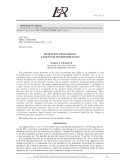Рассматриваются отдельные проблемные вопросы привлечения к административной ответственности в рамках общего состава правонарушения по ст. 5.27 Кодекса РФ об административных правонарушениях. Отмечается, что предмет отрасли трудового права очень подвижен, он уже частично затрагивает и вопросы занятости, и сферу образования, и отдельные аспекты обеспечения национальной безопасности. Следовательно, применение административной ответственности за нарушение указанных норм необходимо организовывать через очень детальное толкование ее распространения на сложные случаи межотраслевого регулирования, затрагивающего сферу труда или отдельные аспекты ее функционирования.
This publication invites discussion on the issue of probation upon hiring as an institution in need of transformation, in the author’s opinion. The goal of probation should be specified, since it can be established either to test the fitness of an employee for the job assigned, or for the employee to decide whether the offered job is suitable for them. Also, it is necessary to resolve the issue of the exact rationale and the moment in time the labor relations with an employee should be terminated during probation in case they do not succeed. The author suggests introducing a new special rationale - termination of a labor contract at the end of the employee’s probation without further employment of the worker at this employer’s based on a wrongdoing by the employee during probation or in case the employer discovers that the worker’s professional aptitude does meet the employer’s requirements. These amendments to the legislation can allow identifying fault-based (disciplinary) grounds for the labor contract termination among all the cases when the worker was considered to have failed the probation upon hiring, as well as to link them directly to the institution of labor discipline. It is no secret that in practice, multiple issues regarding the interaction between the regulatory provisions on probation outcomes and the regulatory provisions on disciplinary responsibility of workers arise: these problems should be resolved, since the court practice examples provided by the author often show diametrically opposed conclusions made by the courts based on their interpretation of statutory regulations. Also, the paper invites discussion on the renunciation of possible replacing probation by a fixed-term temporary labor contract and establishing a probation model for the change in employment functions (transfer to a new job).

